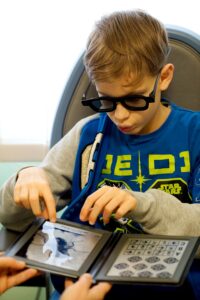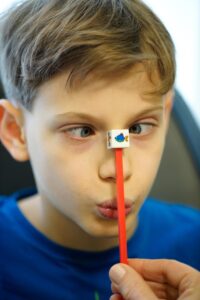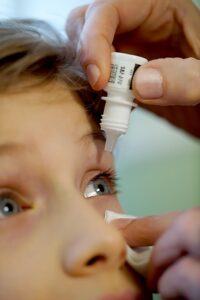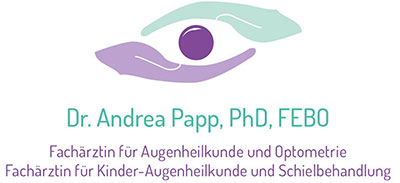A child is not simply a “little adult.” There are many special aspects that ophthalmologists have to consider when examining and treating children.
Pediatric ophthalmology is a subspecialty of ophthalmology where the normal uninterrupted visual development is the main priority. Eye problems (such as ametropia, strabismus, amblyopia, or organic reasons) in childhood must be recognized and treated as soon as possible. If these child-specific conditions are not corrected in time, permanent visual disorders or eye muscle imbalances may develop later. With this early detection, affected children will be able to have optimal visual acuity and spatial vision in adulthood.
A pediatric ophthalmologist:
- identifies, evaluates and treats eye diseases that are specific to children
- identifies the source of strabismus, anomalous head postures, head turns and abnormal eye movements (such as nystagmus),
- provides treatment with glasses, eye covers (occlusion) and/or surgeries (strabismus, nystagmus)
- identifies the organic sources, congenital malformations in cases of suspected genetic syndromes refers the children to a multidisciplinary evaluation
A detailed pediatric eye examination includes the following steps
- Medical history: please take all medical reports,Mutter Kind Pass, eyeglasses, list of medications, allergy pass with you
- Testing the visual acuity with age-appropriate tests
- Eye movement (motility test)
- Testing of stereo vision and binocular vision (3D)
- Convergence test
- Measurement of strabismus angle (distance and near)
- Testing of fixation
- Dilating the pupils
- Determination of objective refraction (retinoscopy)
- Inspection of the lens, vitreous and fundus of both eyes
- Conclusive discussion and medical report
 We have examination equipment specially designed for children. For the precise assessment of the refraction and a thorough retinal examination, it is obligatory to dilate the pupils. Please allow 30 to 45 minutes for the examination. Since the effect of the eye drops disappears only after 4-6 hours, the vision will be somewhat blurred, especially in the near. Please take sunglasses or a cap for the child with you.
We have examination equipment specially designed for children. For the precise assessment of the refraction and a thorough retinal examination, it is obligatory to dilate the pupils. Please allow 30 to 45 minutes for the examination. Since the effect of the eye drops disappears only after 4-6 hours, the vision will be somewhat blurred, especially in the near. Please take sunglasses or a cap for the child with you.
